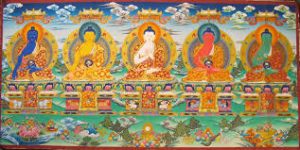
Respectfully quoted from “Palyul Times” published by the Ngagyur Nyingma Institiute
According to Mahayana Buddhism, the ultimate fruition is explained in two states: the body (Skt. kaya)–the self-perfected state that manifests through the body and represents the dimension of the primordial state–and wisdom (Skt. jana)–consciousness that represents the energy of original wisdom. Naturally, they are empty and luminous respectively.
The later one, wisdom, is further categorized into five jnana in accordance with the way of perceiving uncontaminated phenomena. The fundamental nature with twofold purity–the purity of emotional and cognitive obscurations–is called Sphere of Reality Wisdom, which is also the universal substrate of the other wisdoms. Knowing the entirety of phenomena with a single mind is Mirror-Like Wisdom. Perceiving all things as equal in the absence of self-nature is Equality Wisdom. Seeing the non-inherent existence of phenomena vividly and distinctly without any discrimination is Discriminating Wisdom. And knowing the way of performing enlightened activities in order to tame sentient beings is known as Accomplishing Wisdom. These five wisdoms may be elaborated further with the following explanations:
- Sphere of Reality Wisdom (Skt. Dharmadhatu jnana): This wisdom is pure in it’s ultimate nature, from which noble qualities such as power and fearlessness are generated, emerged and are constituted. One would realize it be cleansing the two superficial, cloud-like defilements — the one that obscures omniscience; it is similar to the nature of space. The Sphere of Reality Wisdom was never born in the beginning, neither does it exist in the middle, nor does it cease at the end.
- Mirror-Like Wisdom (Skt. Adarsha Jnana): By cleaning the defiled concept of apprehending object and subject, this is the transformed state of the all-ground consciousness. Here, all existence appears clearly just like the objects appear on the surface of a cleanly-wiped mirror. Mirror-Like Wisdom sees all phenomena in its true form, like an object reflected in the mirror which is devoid of grasping.
- Equality Wisdom (Skt. Samata jnana): When the meditation of the essential nature is clearly realized at the first bhumi, a clear comprehension of self and others is realized, illuminating their equality. Also, when all the bhumis are purified and progressively realized, the afflicted mental consciousness will transform into wisdom. Thus, Equality Wisdom is the imprint of practicing evenness on the learning path, and attains non-abiding nirvana.
- Discriminating Wisdom (Skt. Pratyavekshana jnana): Discriminating Wisdom is the foundation of the concentrative strength, meditative stabilization and meditative absorption. As it closely examines the subtle nature of phenomena, it brings about the essence of dharma, thereby clearing the ignorant mind. Discriminating Wisdom distinctly investigates the specific and general characteristics of phenomena and is applied effortlessly with single-pointed concentration.
- Accomplishing Wisdom (Skt. Krtyanushthana jnana): When the consciousness of the fivefold sense faculties are transmuted they perform boundless and various skillful methods in teh universe and become a common basis to accomplish the welfare of infinite beings. Accomplishing Wisdom knows to perform with myriad skillful means the maturation of disciples in boundless worldly realms.
These Five Wisdoms can be condensed into the Three Kayas. Out of these, the first two wisdoms are subsumed into the Dharmakaya, the third and fourth wisdoms are in Sambhogakaya, and the last wisdom is defined by Nirmanakaya.
The way these wisdoms perceive ultimate reality is in the form of seeing the unseen, whereas the relative perceptions are the mere appearance of interdependent origination. The superimposed images appearing to deluded beings due to their own afflictions are also perceived in teh way a clairvoyant knows the various appearances that dreaming people sees in their dreams. Hence, this is how the wisdoms perceive the world which is beyond the mind of ordinary beings.
Ngawang Lhundrub
7th Year, NNI










